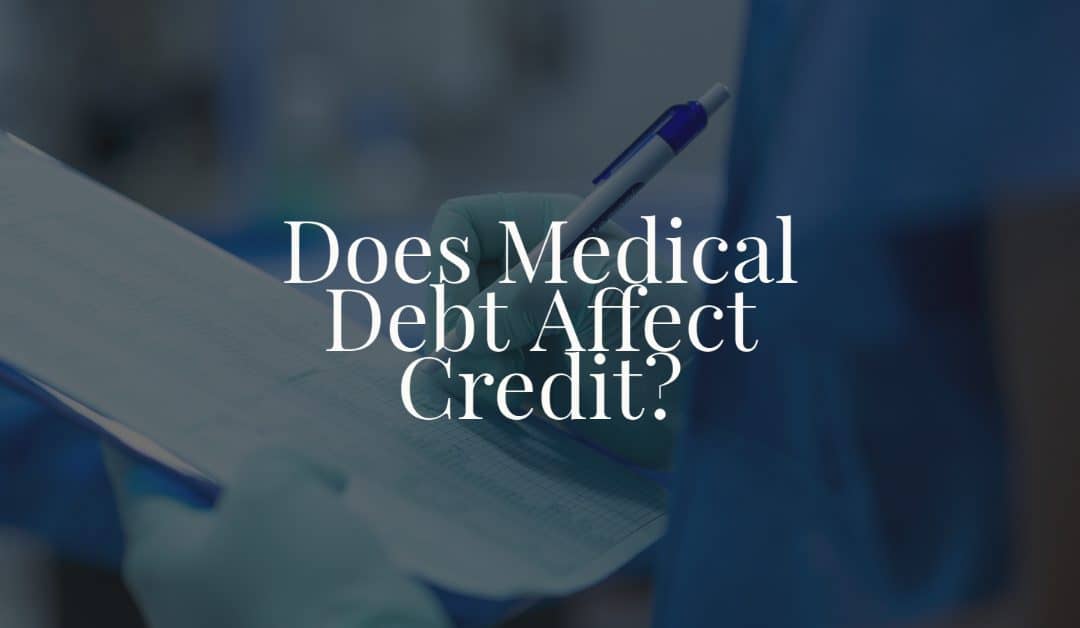When you seek medical treatment, you often don’t know what your insurance company will cover. Depending on your health insurance, It’s not difficult to rack up medical bills for even a “covered” procedure. When you can’t pay your bill and you’re left wondering whether your credit will take the impact, there is some good news. Let’s look at how medical debt affects your credit.
You Are Not Alone
According to the Consumer Finance Protection Bureau, roughly half of all collections on credit reports are for medical bills that hospitals and other providers reported. One-fifth of all consumers in America’s credit system has a credit report with these negative collection reports.
Consumers face widespread erroneous billing issues and overcharging practices from the medical community. Credit reporting agencies are even changing the way they look at medical debt.
Medical Debt IS Different
Owing a medical debt is not a personal failure. Some things are out of our control. You know you’re spending money when you go shopping at the mall, but medical debt can be sneaky and unpredictable. Check out these common reasons why medical debt is not like discretionary spending:
- Medical debt can appear on your credit report without you knowing. You may receive a “covered” medical service and find out 6 months later that the insurance will not pay. A medical bill in the mail is often a shock.
- Consumers face inconsistent information about our coverages. The health insurance customer service representative may tell you that you are preapproved for surgery. Yet, after the surgery, you are told that your provider was out of network at the time.
- You don’t expect additional doctor fees when in the hospital. Hospitals often hire specialists and doctors who work at the hospital but bill separately according to their own charges. There is no way to know how much a hospital visit will cost you in advance. There is no way to prepare.
- Billing errors are problematic. Sometimes, bills get mixed up, and you may receive a bill for someone else’s visit. You could also receive a duplicate bill for something you already paid.
- Medical coding errors can drive your bill up by thousands of dollars, depending on the mistake. Always check your bill to make sure the codes used are correct.
New Credit Scoring Models
The good news is that new credit scoring models give less weight to unpaid medical debt compared to other kinds of debt. This means that your medical debt matters less when calculating your credit score. Using the newer models, you can have a higher FICO or VantageScore, even with medical debt collections showing on your credit report.
The latest FICO scoring model is version 10, but some lenders are still using older versions, dating back to 2009. Banks and lenders decide which model to use when determining who will get the best loans and rates.
Lender Practices
According to underwriters, medical debt is something they see, but not something they use to determine whether someone can take out a loan. Even hardened risk assessors know that you can’t always plan for medical expenses.
The lending community looks very differently at someone who has multiple maxed-out credit cards and someone who has a medical collections report. If you are on the borderline of “yes” or “no” answers for a loan, your debt-to-income ratio or spending habits are more likely to affect the underwriter’s decision than a medical collections debt.
Credit Reporting Agencies
The three credit reporting agencies each compile and maintain a credit report for each of us. When a lender looks at our credit report, they generally pull from one of these three sources: Equifax, Experian, and TransUnion. These reports list our accounts and payment histories.
Credit reporting agencies now recognize that medical debt reporting may not be accurate for 6 months or so. There is now a 180-day waiting period before medical debt appears on your credit record.
According to Experian, “This six-month grace period is designed to give you enough time to correct any errors on your bill, pay the bill or get your insurance company to pay it, figure out a payment plan or otherwise resolve the problem. By taking action within the 180 days, you can prevent medical bills from hurting your credit score.”
If your insurance company comes through and pays your bill, the credit reporting agencies each remove the debt from your credit report at that time.
Unexpected Situations Need An Expert
A Mom to 4 who just went back to work full-time in 2020 saw a physical therapist weekly for back pain. It looked like she was covered in-network with her BlueCross BlueShield policy in North Carolina. The receptionist looked at her insurance plan and assured her that she was covered. She paid her copay at every visit.
However, the insurance was not paying the weekly bill and sent her a letter 3 months later saying that she was not covered at the time of treatment. Her policy had lapsed, and they didn’t let her know for 4 months. She thought the autopay was paying her policy monthly, but a change in her credit card number months earlier caused the autopay to turn off.
The physical therapy bill arrived 5 months after the last treatment and totaled over $5,000. She appealed the decision of the insurance company and received a letter that her appeal was denied. This is just one small instance of medical billing practices gone awry.
If you are facing a similar struggle, there is hope. You can appeal and fight for your rights until you find justice. If unfair or erroneous billing practices are at the heart of your medical debt, find a consumer rights attorney specializing in healthcare consumer issues.
Find Help
Big business sometimes takes advantage of people trying to do their best. At LawZebra, we fight for the little guy. We fight for Moms who trying to use insurance policies for back pain and the child who needs seizure medication that insurance will not cover. Caring about older adult struggling to handle diabetes and running low on insulin is our job. We understand that companies sometimes run roughshod over consumers who are in need.
If you face mounting medical debt with no solution in sight, contact us for a free consultation and find out if you have a case we can get behind. You don’t pay us unless you win your case, so there is no risk to talk with us. Give us a call or contact us online today.

